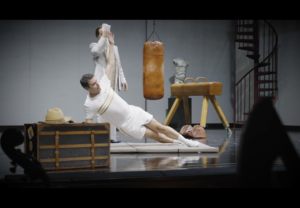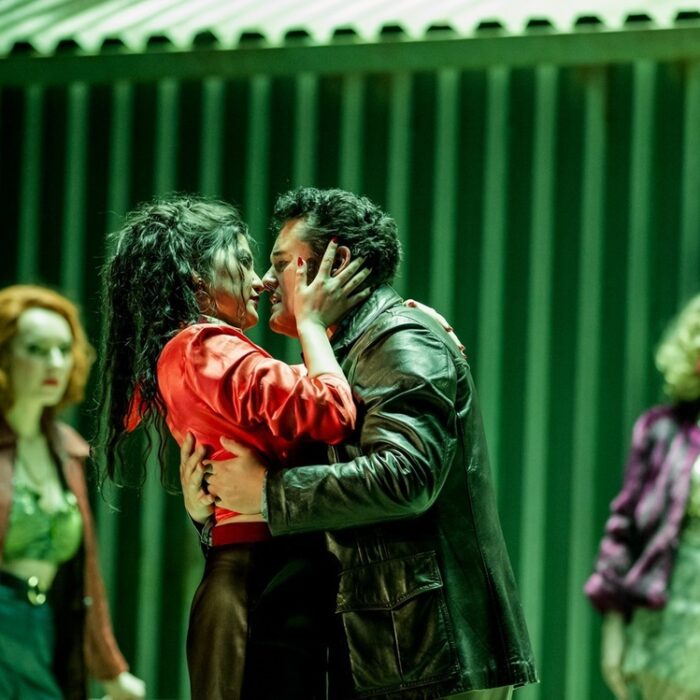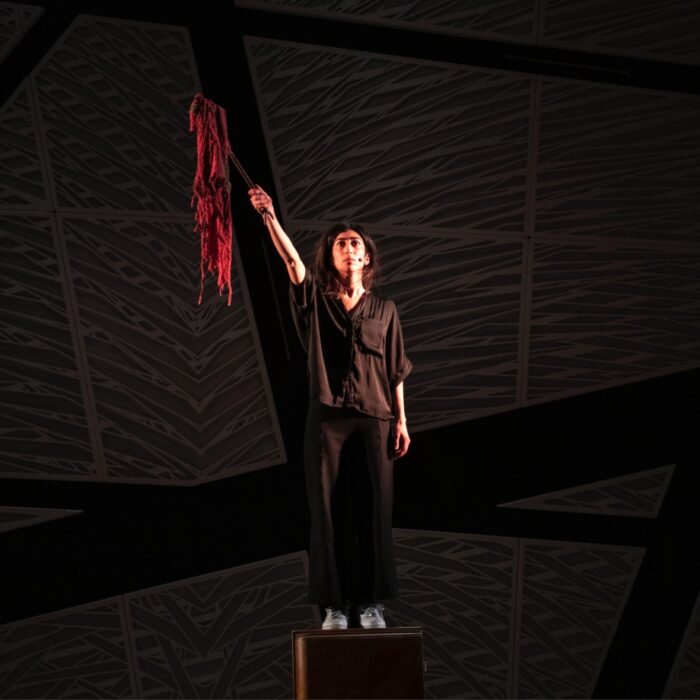
Innsbruck Early Music Festival 2023 Review: L’Olimpiade
Alessandro De Marchi’s Musical Direction Proves Vivaldi’s Adaptability
By Alan Neilson(Photo: Birgit Gufler)
After 13 years in the post, Alessandro De Marchi brings his tenure as the artistic director of the Innsbruck Festival of Early Music to a close with a program dominated by the Venetian composer Antonio Vivaldi. Not only do many of the festival’s events feature his music, including the festival’s closing concert “Lieto Fine,” but all three of this summer’s staged works are by the composer. His 1732 opera, “La Fida Ninfa,” is being performed by a young cast, featuring past participants in the festival’s Cesti competition, which will be followed by a fully staged, strongly cast production of his 1716 oratorio, “Juditha Triumphans.” First off, however, were three performances of the composer’s 1734 opera “L’Olimpiade.”
The libretto, by Pietro Metastasio, was first set to music by Antonio Caldara in 1733 for a performance to mark the birthday of Empress Elisabeth Christine of Austria. It quickly went on to establish itself as one of the most successful libretti in the history of opera. In fact, it is estimated that as many as 60 composers have reset the text to music, including Pergolesi, Leo, Jommelli and Spontini, with Vivaldi’s 1734 version for Venice’s Teatro Sant’ Angelo being the first.
The complex narrative weaves its way through three acts in which deception, surprising revelations, competing love interests, male bonding, conflicting relationships, betrayal and tyrannical rule play out against the backdrop of the Olympic Games. The heart of the story, however, is fairly simple. Two men, Megacle and Licida, who share a deep bond of friendship, are in love with the same woman, Aristea. Fortunately, she turns out to be the long-lost sister of Licida. Thereby, allowing for a happy conclusion in which Megacle marries Aristea and Licida marries his long-suffering lover Argene. The Olympic Games acts as little more than a colorful backdrop. Although the king, Clistene, does use it as a device to find a husband for his daughter Aristea by promising her in marriage to the winner of the games.
Vizioli’s Strong Direction
The director, Stefano Vizioli, however, decided to present the games as the focal point for his staging so that the physical and competitive nature of sport is used to emphasize and support the fundamental core of the relationships between the characters. To this end, the scenographer, Emanuele Sinisi, created a single set. For the most part it took the form of a gymnasium, in which athletes exercised and trained for the games. The set deliberately drew attention to the beauty of the male body. Vizioli added to the impression by playing up the homoerotic possibilities. For example, in Act one scene eight, the meeting between Megacle and Licida is presented as a massage scene. Licida is rubbing his hands over his friend’s body. Also, the character of Aminta was unambiguously excited by the male bodies around him and was clearly drawn to Licida. Likewise, the relationships between the male and female characters often had a physical dimension to them. Even the king was provided with two female escorts, with whom he was physically close.
However, Vizioli did not allow this aspect of the staging to overwhelm the narrative. On the contrary, he kept the drama moving along at a pleasing pace. The arias were rarely allowed to disrupt the flow. He managed to find ways that kept the action flowing. Often, this was imaginatively conceived. Especially, when Raffaele Pe as Megacle did an impressive physical workout while singing “Superbo di me stesso.” He also identified moments of light comedy that he sensitively introduced. Although, he occasionally went a little too far, like when he felt the need to accompany Argene’s aria “Per salve quell’ alma ingrata” with a few plastic flowers that moved in sympathy to her despair and desire to die. This was a little too blatant to raise even a brief smile.
Although, there was little alteration to the basic set design throughout the performance, it proved to be rather versatile. It allowed a number of different settings to emerge. A balcony was positioned on the right-hand side of the stage overlooking the gymnasium. This provided the perfect position for the king to make his entrance. There were simple drops with images of the Olympics that were used at appropriate moments to take the setting outside, and a small bedroom at the back of the stage was uncovered to take the drama into a private space in which Argene reflected on her love for Licida. It was also fairly simple to darken the stage so that the focus rested on the Olympic flame, which gave the staging a completely different ambience.
Apart from the king’s clothing, which hinted at the games’ Hellenistic provenance, Anna Maria Heinreich’s costume designs were inspired by the Olympics of the 1930s. The designs worked well and combined nicely with set designs to create pleasing stage pictures.
Top Quality Singing Performances
The musical side of this production really stood out. It boasted a first-rate cast in top form, which was brilliantly supported by the Innsbrucker Festwochenorchester, under the direction of De Marchi from the harpsichord. Vivaldi’s masterpiece simply zipped along. The performance, which included two intervals, lasted well over four hours. The audience’s attention never flagged. Rather, they applauded and cheered each aria. During the final curtain, the enthusiasm with which they greeted the singers, Maestro De Marchi and the orchestra was tumultuous.
Although it would be an almost pointless exercise to try to identify a standout performance, given the overall high quality of all involved, baritone Christian Senn attracted the audience’s attention with his intelligently formed and sensitive reading of King Clistene. He possessed a strong stage presence and presented King Clistene as a regal and authoritative man. He was strong, although not wild. His emotions clearly formed a multi-layered portrait. Whether he was moved to anger or sympathy, happiness or frustration, the emotions grew seamlessly from his underlying characterization. He created an integrated and believable stage personality. All of this was underpinned by his strong singing performance, founded upon his excellent technique.
Da Sà’s Show-Stopping Performance
Bruno Da Sà, as Aminta, wowed the audience with a stunning virtuoso display in the second of his three arias, “Siam navi all’onda algenti.” He defines himself as a soprano rather than a countertenor, and if you close your eyes while he is singing, you will swear you are listening to a female singer. The tone and quality of his voice are certainly not those of a countertenor. His voice is bright and versatile. He possesses the quality of a natural sounding soprano without any sense of artifice. When alone on stage, and against a backdrop of images from the Olympics, he produced a riveting rendition of the aria. Afterwards, the cheering audience ensured he return to the stage to take another bow. Certainly, there was a lot of showmanship in his performance as he spun out long and complex ornamented lines full of stunning coloratura passages and impressive leaps. He had the necessary strength and energy needed for his voice to do this. He never showed the smallest signs of stress. His voice flowed with ease. He was also clearly enjoying himself as he fully hammed up his acting.
His overall performance as Aminta, whom he characterized as openly homosexual, was compelling. He embraced the stereotype head-on and successfully developed both comic and dramatic dimensions to the character. Given that the background is centered on physically strong men developing their bodies in the gym, it was an idea that worked very well indeed.
Bejun Mehta portrayed a fairly unpleasant Licida. He was demanding, arrogant and possessed an attitude of self-entitlement. He was not somebody you would want to owe a favor to. His voice, on the other hand, was an absolute delight. It has a beautiful, consistent tone, which he employed with impressive versatility in an unhurried manner. His expertly moulded phrases possessed a seamless quality that lay pleasantly on the ear. He intelligently adapted to the emotional state he was presenting. In his aria “Mentre dormi, Amor fomenti,” he sang with a delicate sensitivity that highlighted his voice’s appealing timbre. He delicately formed passages of light coloratura and gentle leaps. He sang one of the most elegant and appealing arias of the evening. By contrast, for the aria “Gemo in un punto e fremo,” which brings Act two to a close, he produced an intense, strident and forceful reading that perfectly captured his agitated state. The underlying beauty, consistency and sensitivity of his singing remained unaffected.
Countertenor Raffaele Pe produced a dramatic and strong reading of the loyal and honest, yet unfortunate Megacle. He finds himself in debt to Licida. If he does what Licida wants of him, he loses Aristea, the woman he loves. If he refuses, he betrays the man who saved his life. It is an impossible situation, perfectly designed to precipitate extreme emotions, and this is exactly what Pe did. His recitatives were deftly fashioned to highlight the depths of Megacle’s conflicting emotions. His arias were sensitively rendered to explore the complexity of his feelings. He sang “Superbo di me stesso” as an open and lively rendition that reflected his delight in being able to help out Licida. He moved his voice with plenty of flexibility and brio. At this point, he has no idea of the full consequences of what is being asked of him. By contrast, the aria in which he reaffirms his loyalty to Licida, “Lo seguitai felice,” follows his attempted suicide. Since having accepted that he has lost Aristea, he gives a very different reading. In what was an expressively ambiguous and nuanced rendition, he provided an interpretation that could simply be taken as a literal representation of the text. The forced emotions in his voice emphasized dynamic contrasts and the staccato coloratura suggested the anger, anxiety and confusion that lay beneath.
The contralto Margherita Maria Sala is not a singer prone to histrionics or wild outbursts. Her singing is always controlled, precise and balanced, yet she is quite capable of portraying strong emotional states. She displayed these qualities in her fine portrayal of Aristea, which certainly has its fair share of intense suffering, pain and joy. In her aria “Sta piangendo la tortorella,” Aristea reflects on her suffering. This allowed Sala to show off her impressive vocal control as she spun out detailed and delicate lines, ornamented with birdlike word painting, light coloraturas and sensitive dynamic contrasts. On the other hand, she was in a more feisty frame of mind when delivering the short aria “Tu da me dividi,” in which she rages at Licida. Her anger was palpable. Her voice was strident, forceful and agitated as she emphasized her feelings, yet the voice was not wild or out of control. She gave a quality performance.
In his program notes, Vizioli likened Argene, the long-suffering lover of Licida, to Mozart’s Donna Elvira. And, his observation is not without merit. Initially, Licida abandons her to chase after Aristea. But, her love never wavers, and she is prepared to forgive him for everything. Mezzo-soprano Benedetta Mazzucato, as Argene, fitted the bill perfectly. She was costumed, for the most part, as a dowdy shepherdess who spent most of her time lamenting Aristea’s loss. Although, not without sufficient pain and anger. Argene tries to calm the situation between Aristea and Megacle. Benedetta Mazzucato possesses a full-bodied voice with a distinctive timbre, which she employed with plenty of flexibility to successfully develop her character. The aria “Per qui tanti suoi sospiri,” in particular, showed off her talent. Against the background of a vibrant orchestra, Mazzucato produced a lively rendition replete with leaps, passages of coloratura and pleasing ornamentations as she gave her voice over to her torments.
Bass Luigi De Donato gave a rich performance in his relatively small part as Alcandro. His best moment came in his Act three aria, “Sciagurato in braccioea morte,” for which he provided a vibrant and versatile rendition that showed off his voice’s technical and interpretative abilities.
The small chorus, Coro Maghini, sang from behind a gauze netting in the box seats on either side of the stage. They gave a suitably professional performance for what seemed to be only a small number of short interventions.
De Marchi led the Innsbrucker Festwochenorchester in a rhythmically vigorous performance that highlighted the score’s vitality and dramatic strength. From the overture onwards, the orchestra attacked the line and highlighted the dynamic contrasts while ensuring that it was always working in tandem with the onstage drama. The overall balance, both within the orchestra and from the singers, was beautifully managed throughout.
This production was a real triumph, not just on a personal level for the artistic director Alessandro de Marchi or for the festival, which has brought so many neglected works back to life over the years. But, because it provides more evidence of Vivaldi’s genius as a composer of opera. “L’Olimpiade” is not just a work that boasts fine music as having many attractive melodies, it is also dramatically strong. It proves itself as adaptable to a variety of settings.
Vivaldi’s rehabilitation into the canon is well underway, and on the evidence of this performance, not a minute too soon.



